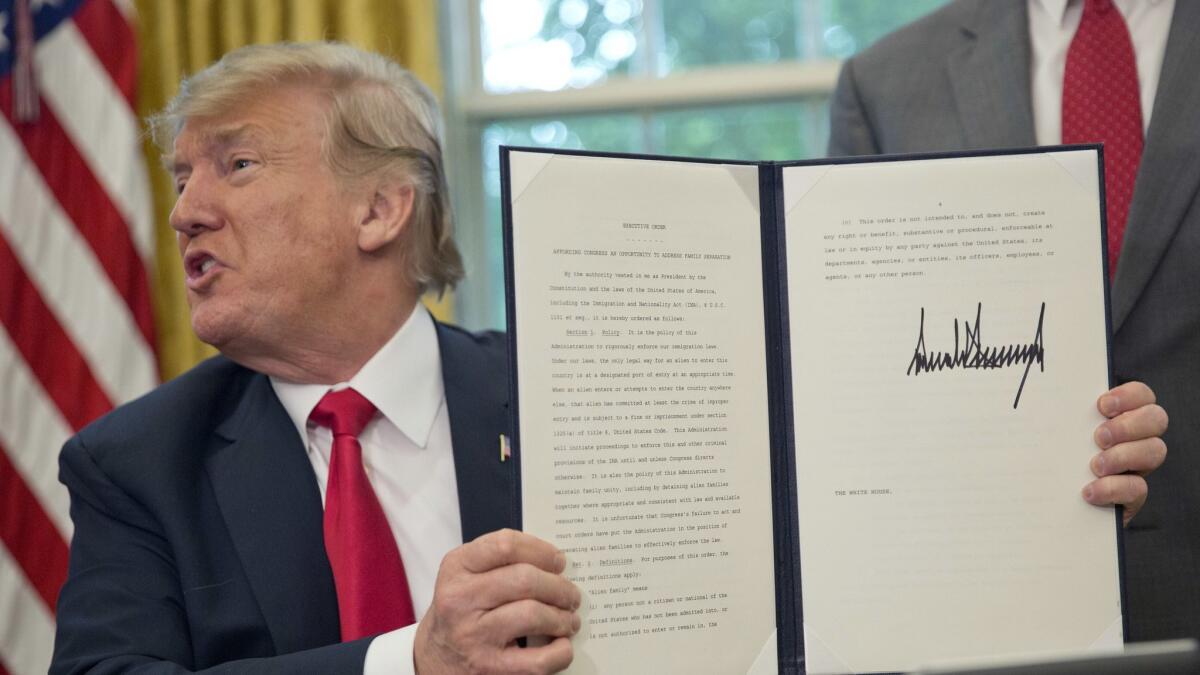Capitol Journal: Trump’s order to end his family separation policy was purely political — not a change of heart

- Share via
Reporting from Sacramento — The heart-rending sound of children crying for their mothers and the disturbing sight of little kids confined in wire cages are more powerful than any president.
No national policy is worth ripping weeping toddlers from their parents’ arms and placing them in custody, and most people instinctively understand that — even if some politicians don’t.
Hyperbolic, you might say. But perhaps you haven’t listened to an audio recording obtained by ProPublica, a nonprofit investigative news agency. The audio quickly went viral. On it you’ll hear the sobbing of several Central American children, crying desperately for “mami” and “papa.”
There’s a persistent 6-year-old Salvadoran girl who keeps pleading for someone to please call her aunt. She’ll come and get her. That’s what her mother said she should do. She has memorized the phone number. Finally someone listens.
But the aunt couldn’t pick her up, she told ProPublica, because she also has an immigration problem and it was too risky.
“I know she’s not an American citizen,” the aunt was quoted as saying about her niece, “but she’s a human being. She’s a child. How can they treat her this way?”
They can unless the public becomes outraged and intervenes, pressuring Congress and the president.
And it did, spurred by constant TV footage and still photos of the chicken-pen-like cages and hot tents the kids were being corralled into at detention centers.
Meanwhile, their parents were confined somewhere else trying to explain to border agents that they deserve asylum because they’re fleeing crime-ridden, economically depressed Central American countries essentially run by drug cartels.
The mournful sounds and depressing sights quickly ignited a wildfire of public revulsion.
“Images and sounds are the most effective communication,” says Barbara O’Connor, former director of the Institute for the Study of Politics and Media at Sacramento State University. “They’re different than words. They connote a much deeper feeling than words ever can. They bring our own feelings and values and experiences to the table.
“Ninety percent of what we take away from communication is nonverbal. Even the president is vulnerable to it.”
By Monday, roughly two-thirds of American voters were opposed to President Trump’s policy of separating children from their parents as part of his “zero tolerance” war against illegal immigration, according to a Quinnipiac University poll.
On Wednesday, Trump performed a rare retreat and signed an executive order ending family separations. He acted because of political necessity, not a change of heart.
“We’re going to keep families together,” he announced, without saying where they were going to be kept. “But we still have to maintain toughness or our country will be overrun by people, by crime, by all the things that we don’t stand for and that we don’t want.”
Same ol’ Trump.
Republican politicians — especially those running for election — already were deserting the president on his family breakup policy. Sen. Ted Cruz of Texas, who’s seeking reelection, proposed legislation to prevent separating children from their parents at the border.
In California, that was a lifeline for retired El Dorado County Judge Steven Bailey, the underdog Republican candidate challenging Democratic Atty. Gen. Xavier Becerra. Bailey is a strong supporter of almost everything Trump, but not separating children from parents. Bailey said Tuesday he supports Cruz’s legislation.
Becerra on Tuesday joined 20 other state attorneys general across the country in demanding an end to Trump’s zero-tolerance policy. Becerra called it “inhumane and … a new low for President Trump.”
The dark-horse Republican candidate for California governor, businessman John Cox, also has been a strong backer of virtually every Trump policy — but not on baby snatching from immigrant moms.
Coverage of California politics »
“I’m against separating parents and children,” Cox told reporters. “I’m a father. I have four daughters.”
But he didn’t have a solution: “That’s a congressional problem.”
California’s Republican House members had been backing away from Trump’s immigration policies. Rep. David Valadao of Hanford urged the administration to knock off the family splitting.
Rep. Jeff Denham of Turlock has been bucking the president and party leaders trying to protect so-called Dreamers, young people brought to the country illegally by their parents as children.
In Sacramento, Republican legislators may be forced to take a stand on Trump’s zero-tolerance policy. There’s a resolution by Sen. Kevin de León (D-Los Angeles) denouncing “the separation of families fleeing violence and persecution.” But maybe that’s moot by now.
De León also sent Gov. Jerry Brown a letter asking him to bring back 400 California National Guard troops he sent to the border in April at Trump’s request. Brown decreed they couldn’t help enforce immigration law. He restricted them to fighting such crime as drug smuggling.
But De León argues that this just frees up federal border agents to carry out Trump’s zero-tolerance program.
“We shouldn’t be wasting our tax dollars to help agencies that are committing potential human rights violations,” De León told me.
Brown probably is a bit irked at De León, who’s challenging U.S. Sen. Dianne Feinstein for reelection. Feinstein is running far ahead and fighting Trump hard on immigration. She’s all over national TV. And De León needs attention.
Brown won’t be recalling the troops. He wants to retain some relationship with a president whose help California will need on other issues.
Meanwhile, Trump finally did the right thing and stopped tormenting little kids. At least for now.
We don’t know what he’ll do next, but hopefully there’ll be sound and video.
Follow @LATimesSkelton on Twitter
More to Read
Get the L.A. Times Politics newsletter
Deeply reported insights into legislation, politics and policy from Sacramento, Washington and beyond. In your inbox three times per week.
You may occasionally receive promotional content from the Los Angeles Times.











